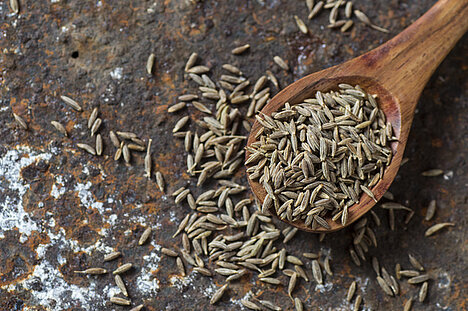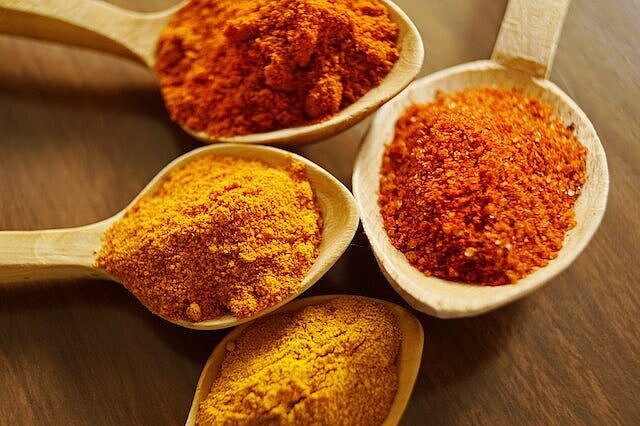Cumin

But did you know that cumin is also healthy for dogs? In this article, you will find out what cumin is, what its benefits and disadvantages are and how you can feed it to your dog.
What is cumin?
Cumin is an annual plant that grows up to 50 cm high. It has finely pinnate leaves and small white or pink flowers that are arranged in umbels. The fruits are elongated seeds with fine bristles that are yellowish-brown to gray. They have an intense odor and a slightly pungent, earthy and bitter taste.
Cumin originally comes from the Middle East and was used as a spice and medicinal plant 4000 years ago. It was also valued in antiquity and the Middle Ages and spread across the Mediterranean to South East Asia. Today, cumin is cultivated in many countries and is an important ingredient in spice blends such as curry, garam masala and ras el hanout.
What are the benefits of cumin for dogs?
Cumin has many beneficial effects for dogs due to both its nutritional content and its essential oils. Here are some of them:
- Digestive: cumin stimulates the production of stomach acid and digestive enzymes, helping to break down food. It also has an antispasmodic effect and relaxes the muscles of the gastrointestinal tract. This helps with flatulence, bloating or constipation.
- Anti-inflammatory: Cumin contains antioxidants that neutralize free radicals and thus prevent cell damage. It is also effective against inflammation in the body, which can lead to various diseases such as arthritis, allergies or skin problems.
- Immune boosting: Cumin strengthens the immune system by stimulating the production of antibodies and increasing the activity of white blood cells. It also has antibacterial, antiviral and antifungal properties and can therefore prevent or fight infections.
- Blood sugar regulating: Cumin lowers blood sugar levels by promoting insulin secretion and improving glucose uptake into the cells. This can be helpful for dogs with diabetes or obesity.
- Rich in iron: Cumin is a good source of iron, a mineral that is important for the formation of red blood cells. Iron deficiency can lead to anemia, which manifests itself as tiredness, weakness or paleness.
- Anthelmintic: Cumin can help against intestinal parasites such as worms by paralyzing or killing them. It can also reduce the risk of re-infection.
- Appetite stimulant: Cumin increases appetite by stimulating the sense of taste and increasing salivation. This can be useful for dogs that eat little or are fussy eaters.
What are the disadvantages of cumin for dogs?
While cumin has many benefits for dogs, it can also have some disadvantages if dosed or used incorrectly. Here are some of them:
- Allergic reactions: Cumin can cause allergic reactions in some dogs, which can manifest as a skin rash, itching or difficulty breathing. When you give your dog cumin for the first time, you should therefore look out for possible signs of an allergy.
- Stomach irritation: Cumin can cause stomach irritation in sensitive dogs, which can manifest as nausea, vomiting or diarrhea. This is because the spice stimulates stomach acid production and thus increases acidity. If your dog has a sensitive stomach or suffers from stomach ulcers, you should therefore give him little or no cumin.
- Blood-thinning: Cumin has a blood-thinning effect, which can increase the risk of bleeding. This can be problematic for dogs that suffer from blood clotting disorders or take medication that also has a blood-thinning effect. If your dog belongs to this group, you should give him little or no cumin.
- Labor-inducing: Cumin can have a labor-inducing effect and thus trigger a miscarriage or premature birth. This can be dangerous in pregnant bitches. If your dog is pregnant or is due to become pregnant, you should therefore give her little or no cumin.
How do you feed cumin to dogs?
If you want to give your dog the benefits of cumin, there are a few things to keep in mind:
- Quality: make sure you buy high-quality organic cumin that is free from pesticides or other harmful substances. You can use either whole seeds or ground powder.
- Dosage: Start with a small amount of about a quarter of a teaspoon per 10 kg of body weight per day and monitor your dog for possible side effects. You can slowly increase the amount up to one teaspoon per 10 kg of body weight per day. Do not exceed this amount without veterinary advice.
- How to use: Mix the cumin seeds into your dog's food or give him a treat with the spice in it. You can also make a tea from the seeds and offer it to your dog to drink.
- Variety: Don't give your dog cumin every day, but alternate it with other healthy spices such as turmeric, ginger or cinnamon. This way you avoid overdosing or an aversion to the taste.
Cumin is a plant with many health benefits for dogs. It can aid digestion, reduce inflammation, boost the immune system and more. However, cumin should be dosed and used with caution as it can also cause allergic reactions or stomach irritation. High-quality, certified organic cumin should be used, and the dosage should be increased slowly to avoid side effects. Care should also be taken not to overuse cumin and to alternate it regularly with other spices.
Properties 4
Are you looking for other ingredients with a specific property?
Just click on them to find more.
If you notice any signs of hypersensitivity or poisoning in your dog, you should see your vet immediately. We are not a substitute for a vet, but we try to be as accurate as possible. Every dog reacts differently and we recommend you get a second opinion or consult your vet if in doubt.
Stay healthy and take good care of your four-legged friend!😊
Similar to Cumin
Coriander, also known as Chinese parsley or coriander leaves, is a plant that is used as a spice in many parts of the world. The plant belongs to the umbellifer family and has delicate, green leaves...
Anise belongs to the umbellifer family and is related to fennel, caraway and dill. The plant has white flowers and small, brown seeds that have a sweet, licorice-like taste. Aniseed originates from...
Cumin is an annual plant that belongs to the umbellifer family. It has fine leaves and small white or pink flowers. The fruits of the plant are harvested and dried as seeds. These seeds have an...
Chili powder is a spice that is made from dried and ground chili peppers. There are different types of chili peppers, which have different levels of heat. The pungency is determined by a substance...



